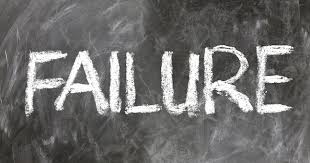My feeds are filled with data and stories of selling failures. “Our people aren’t prospecting enough! They aren’t keeping healthy pipelines/funnels! They aren’t winning enough deals! They aren’t using the tools! They aren’t making quota!”
It’s so easy to blame our people for bad sales performance, but are we assigning the responsibility correctly? Is the failure because of them, or are they failing for some other reason?
It’s so easy to blame our people. After all, they are doing the work, they are the people directly accountable for producing results, and when they don’t produce them, it’s easy to point the fingers at them.
It’s human nature to try to assign blame, but assigning blame doesn’t solve the problem. And, it’s rare the blame can ever be attributed to a single individual. Just like it takes a team to win, it takes a team to fail.
There are many types of failure, let me focus on the two that tend to dominate sales performance.
The first, and I suspect the smallest category is the failure of individuals in meeting performance expectations. There are many reasons an individual might fail. They may not be the right person for the job, which actually is a failure in the hiring process. They may not have the skills to perform as expected. When we encounter this, both sales enablement and the front line sales manager need to coach and help that individual improve their performance. If they can’t improve and meet performance objectives, we need to move them into roles where they can meet performance expectations, and sometimes it is in roles outside the company.
The more common failure are systemic failures. These are failures not of a few individuals, but we see the majority of the organization not able to achieve their goals. These are crippling to the organization, and too often, the way we deal with systemic failure either aggravates or prolongs them.
Systemic failure are not failures of individuals. They are doing what we have told, trained, equipped, and hopefully coached them to do. For so many to be failing something other than their individual performance is wrong.
We may have the wrong strategies, the wrong approaches to the markets, noncompetitive offerings. They may not have the right training, tools, support, or coaching to perform as expected. We may have unrealistic expectations of performance.
Replacing the people, in this case, does not solve the performance problem–yet, too often, that’s just what we do. We get rid of SDRs/BDRs, bringing in new teams, outsourcing it, or asking AEs to do those things. But if whoever replaces these people are doing the same things as before, they will continue to fail.
We need to drill down, trying to understand why so many people, so consistently, cannot achieve their goals. If we can’t determine the root causes and correct them, nothing we do will change the outcomes.
Failure to understand why our people and organizations fail, and what we must do to correct performance is a leadership issue–more specifically it’s a leadership failure.
While, I’m on the topic of failure, we need to re-assess our mindsets about failure. While we shouldn’t purposefully set out to fail (if we do, we are likely to succeed in that endeavor), but we shouldn’t avoid failures. We learn and develop more through our failures, than we do through our successes. When we succeed, we tend to do more of the same, never recognizing we might do better by doing things differently. But failure causes us to recognize we need to change, we need to do something differently.
Too often, we underperform our potential, because we are “succeeding.” I don’t know how many executives I meet, saying “We’re hitting our numbers, why change?” But when you look at how they are achieving their number, we discover low win rates, low average deal values, customers buying in spite of what sellers are doing, wasted/unproductive efforts, excessive spending, and any number of things. But as long as the sole metric if success is hitting the number and teams are hitting them, most of the time we fail to recognize we could do much better.
Finally, while I alluded to this before, failure is very seldom the result of the action/inaction of a single person, rather the collected error of many. People will make mistakes, they need coaching and support to recognize and correct those mistakes. Without that, they will continue to fail. Too many of our efforts at identifying and assigning blame tend to be exercises in avoidance.
We all want to succeed and outperform, and sometimes the best way to do this is through our failures.

Leave a Reply